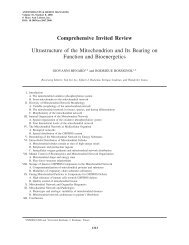MiPsummer Programme pdf - Mitochondrial Physiology Society
MiPsummer Programme pdf - Mitochondrial Physiology Society
MiPsummer Programme pdf - Mitochondrial Physiology Society
You also want an ePaper? Increase the reach of your titles
YUMPU automatically turns print PDFs into web optimized ePapers that Google loves.
71<br />
Abstract # 40<br />
Linking placental mitochondrial dysfunction and taurine deficiency to development of<br />
pregnancy complications in maternal obesity.<br />
Michelle Desforges<br />
Maternal & Fetal Health Research Centre, University of Manchester, Manchester, UK.<br />
Background: The last decade has seen an alarming rise in the number of obese women of<br />
reproductive age. Maternal obesity increases the risk of developing pre-eclampsia (PE), fetal growth<br />
restriction (FGR) and stillbirth but reasons for this are unclear. Each of these serious pregnancy<br />
complications is associated with increased oxidative stress and placental pathology, particularly in<br />
the outer syncytiotrophoblast (STB) layer and underlying cytotrophoblast (CTB). STB is renewed<br />
to preserve its function as a solute transporting epithelium and endocrine/paracrine organ,<br />
maintaining nutrient delivery to the fetus and producing hormones that sustain pregnancy. STB<br />
renewal occurs by CTB that proliferate, differentiate, and fuse with the multinucleated STB. In PE<br />
and FGR there is reduced CTB proliferation and fusion, and increased CTB apoptosis which leads<br />
to placental insufficiency. Reduced STB taurine transporter (TauT) activity is also a feature of PE<br />
and FGR as well as maternal obesity during the first trimester and at term 1 . In non-placental cells,<br />
taurine protects against damage caused by factors which are elevated in obesity such as<br />
inflammatory cytokines and reactive oxygen species. Emerging evidence suggests taurine’s<br />
cytoprotective role is related to its ability to promote mitochondrial function 2 . Interestingly,<br />
mitochondrial dysfunction has been demonstrated in placentas from PE and FGR 3 . In addition to<br />
supplying cellular energy, mitochondria are involved in a range of processes important for<br />
maintenance and function of STB, such as intracellular signalling, cellular differentiation, and cell<br />
death. This project is beginning to test the hypothesis that reduced placental taurine transport causes<br />
mitochondrial dysfunction which leads to compromised STB renewal and increased susceptibility to<br />
damage, providing a link between maternal obesity and development of pregnancy complications.<br />
Objective: To investigate CTB differentiation and susceptibility of STB/CTB to death and damage<br />
following inhibition of TauT in term human placenta.<br />
Methods: Two in vitro approaches were used: i) STB model: CTB isolated from normal pregnancy<br />
(NP) were maintained in primary culture for 66 hrs during which time they differentiate into<br />
multinucleated STB. TauT was inhibited using siRNA technology. Immunofluorescent staining of<br />
desmosomes allowed visualisation of multinucleation (used to assess differentiation). In parallel<br />
experiments to investigate susceptibility to cell death, prior to fixation at 66 hrs, cells were cultured<br />
overnight +/- the inflammatory cytokine TNF. Apoptosis was measured by presence of cleaved<br />
cytokeratin 18, detected by immunohistochemistry (IHC). ii) Explant model: Placental villous<br />
explants from NP were maintained in culture for 7 days. TauT was inhibited by incubating explants<br />
with the taurine antagonist -alanine. To investigate susceptibility to damage, explants were treated<br />
+/- H 2 O 2 from day 5 and oxidative damage to DNA was assessed by 8-hydroxyguanosine IHC.<br />
Results: siRNA-mediated TauT knockdown in CTBs inhibits their differentiation into<br />
multinucleated syncytia (n=7, p



